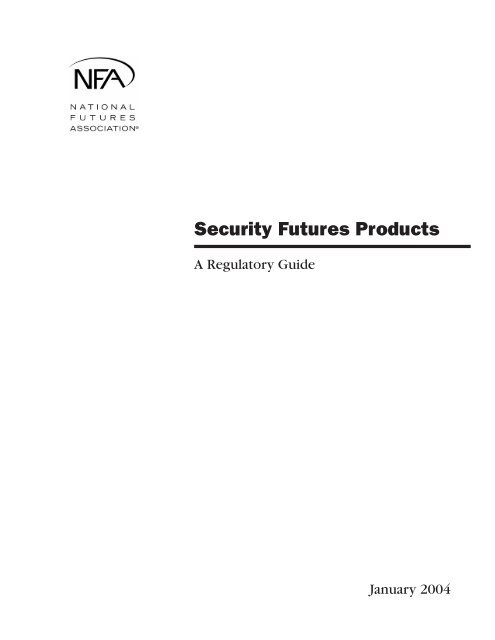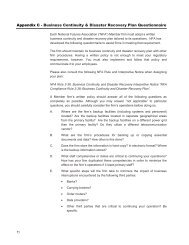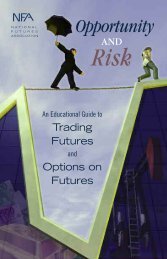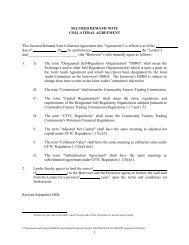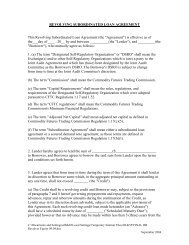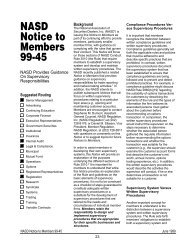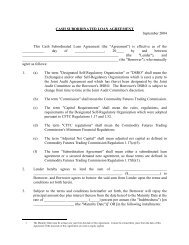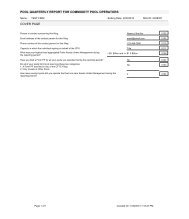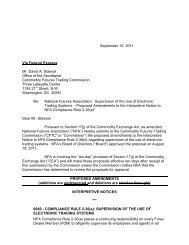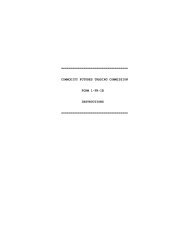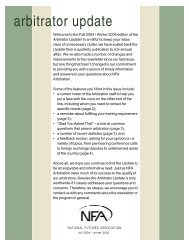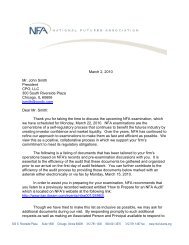Security Futures Products: A Regulatory Guide - National Futures ...
Security Futures Products: A Regulatory Guide - National Futures ...
Security Futures Products: A Regulatory Guide - National Futures ...
Create successful ePaper yourself
Turn your PDF publications into a flip-book with our unique Google optimized e-Paper software.
N A T I O N A L F U T U R E S A S S O C I A T I O N<br />
<strong>Security</strong> <strong>Futures</strong> <strong>Products</strong><br />
A <strong>Regulatory</strong> <strong>Guide</strong><br />
January 2004
Table of Contents<br />
Introduction................................................................................................ 1<br />
What are <strong>Security</strong> <strong>Futures</strong>?.......................................................................... 2<br />
Registration and Proficiency Requirements ................................................. 3<br />
Account Opening ........................................................................................ 6<br />
General Supervision .................................................................................. 10<br />
Promotional Material ................................................................................. 13<br />
Trading and Execution Issues .................................................................... 16<br />
Use of Non-Public Information and Other Securities Law Issues................. 18<br />
Appendix 1: Selected Listing of NFA, CFTC and SEC Requirements<br />
for SFPs ..................................................................................................... 21<br />
Appendix 2: Sources of Additional Information.......................................... 23<br />
Appendix 3: <strong>Security</strong> <strong>Futures</strong> Issues for Fund Operators and Advisors ....... 24<br />
Appendix 4: Information to be Obtained from Customers who are<br />
Individuals ................................................................................................ 26<br />
Appendix 5: Guidance on Procedures to Comply with NFA Compliance Rule<br />
2-37(b) ..................................................................................................... 27
Introduction<br />
The Commodity <strong>Futures</strong> Modernization Act of 2000 (CFMA) authorized<br />
futures contracts on single securities and narrow-based indices (security<br />
futures products). Unlike other futures contracts, however, the CFMA provides<br />
that security futures products are both futures and securities and are regulated<br />
under both schemes.<br />
When the President signed the CFMA on December 21, 2000, NFA became a<br />
national securities association for the limited purpose of regulating the<br />
activities of our Members who are notice-registered as brokers or dealers in<br />
security futures products. These firms are allowed to register by filing a short<br />
notice-form and are exempt from some provisions of the securities laws<br />
because they limit their securities activities to security futures products.<br />
Registration requirements are discussed in more detail in a later section.<br />
This <strong>Guide</strong> is primarily for our Members who notice-register as brokerdealers.<br />
If your firm is a fully registered securities broker-dealer, you are<br />
required to meet NASD’s security futures requirements. NFA’s rules are<br />
very similar to NASD’s rules, but there are a few differences.<br />
Since the securities laws apply to security futures products, the regulatory<br />
scheme for these products introduces new requirements. We have developed<br />
this <strong>Guide</strong> to help our Members understand these requirements and provide<br />
you with resources about offering and trading security futures products for<br />
customers. However, this <strong>Guide</strong> does not cover every requirement and does<br />
not include every detail about the requirements it does cover. You should read<br />
NFA’s rules and interpretive notices and the CFTC and SEC rules for intermediaries<br />
engaged in security futures activities. The most significant rules are listed<br />
in Appendix 1 at the back of this <strong>Guide</strong>.<br />
The CFMA required NFA to adopt several additional requirements for security<br />
futures products. As you will see when you read this <strong>Guide</strong>, we adopted a new<br />
Compliance Rule 2-37, enhanced our existing rules, and adopted several new<br />
interpretive notices. We have listed the relevant rules and interpretive notices<br />
at the end of each section. You can refer to these for clarification and specific<br />
details about each requirement. NFA’s other futures rules also apply to these<br />
products.<br />
We hope you will find this <strong>Guide</strong> useful, and we welcome your suggestions on<br />
how we can better assist you in meeting your regulatory obligations.<br />
- 1 -
What are <strong>Security</strong> <strong>Futures</strong>?<br />
<strong>Security</strong> futures products are futures whose underlying instrument is either a<br />
single security or a narrow-based security index.<br />
<strong>Security</strong> futures do not include futures on broad-based stock indices, such as<br />
the Dow Jones Industrial Average, the Nasdaq indices, the NYSE Composite,<br />
and the S&P 500 that currently trade on futures exchanges. These indices are<br />
regulated by only the CFTC and must be traded through a futures firm.<br />
<strong>Security</strong> futures products do not represent ownership in a corporation and,<br />
therefore, the owner of the security futures contract is not regarded as a<br />
stockholder and does not receive dividends or invitations to stockholder’s<br />
meetings.<br />
<strong>Security</strong> futures may be traded on a variety of facilities, including registered<br />
securities and futures exchanges and alternative trading systems. Like other<br />
futures contracts, security futures are currently not fungible (i.e., you must<br />
liquidate a specific security futures contract on the same exchange where you<br />
purchased it).<br />
<strong>Futures</strong> on Single Securities<br />
<strong>Futures</strong> on single securities can involve a single stock, an exchange-traded<br />
fund, or another type of security jointly authorized by the CFTC and the SEC.<br />
For example, if a customer purchases a December 2003 contract on XYZ<br />
stock at the current futures price, the customer has entered into a legally<br />
binding agreement to buy XYZ stock in December 2003.<br />
<strong>Futures</strong> on Narrow-Based <strong>Security</strong> Indices<br />
In this case, a customer purchases a futures contract for a stock index that<br />
represents only a small part of the market. The indices may include stocks<br />
from particular industries such as telecommunications or airlines. This allows<br />
customers to trade in a specific market sector. For example, if a customer<br />
purchases a December 2003 contract on the ABC index, the customer has<br />
entered into an agreement to buy the underlying stocks in December 2003 in<br />
the proportions included in the index.<br />
An index is considered a narrow-based security index if it has any one of the<br />
following characteristics:<br />
• The index consists of nine or fewer component securities;<br />
• One stock constitutes more than 30 % of the index’s weighting;<br />
• The five highest weighted stocks comprise more than 60 percent of<br />
the index’s weighting; or<br />
• Securities in the lowest 25 % of the index’s weighting fall below<br />
specified thresholds of average daily trading volume.<br />
Additional Resources<br />
For more detailed information about the specific security futures products<br />
that are currently traded, we recommend that you consult the various exchanges<br />
that offer these products. We have included a list of these exchanges<br />
in Appendix 2 of this <strong>Guide</strong>.<br />
- 2 -
Registration and Proficiency Requirements<br />
Because security futures products are securities as well as futures, the CFMA<br />
gave the CFTC and the SEC joint jurisdiction over them. As a result, brokerage<br />
firms must be registered with both agencies in order to offer and trade these<br />
products.<br />
FCMs and IBs<br />
If your firm is a registered FCM or IB that is also fully registered with the SEC<br />
as a broker-dealer, it has no further registration obligations.<br />
If your firm is not currently registered as a broker-dealer, it must noticeregister<br />
by filing a Broker-Dealer Notice Registration Form (Form BD-N) with<br />
NFA. You can download this four-page form directly from NFA’s Web site<br />
(www.nfa.futures.org). There is no filing fee and the firm’s notice-registration<br />
is effective upon filing as long as the form is complete and the eligibility<br />
requirements are met.<br />
If your firm notice-registers as a broker-dealer, it will be exempt from some<br />
requirements of the securities laws that duplicate futures requirements. These<br />
include financial requirements, prohibitions on certain exchange members<br />
doing both proprietary and customer trading, and risk assessment rules. Also,<br />
your firm is not required to become a member of NASD since the firm’s<br />
securities business must be limited to offering and trading security futures<br />
products.<br />
Similarly, broker-dealers who are not currently FCMs or IBs can notice-register<br />
as FCMs or IBs if they are registered with the SEC as full-fledged brokerdealers<br />
and members of NASD. These firms notice-register with the CFTC on<br />
Notice Form 7-R, which is two pages long. Again, you can download the form<br />
from our Web site and file it with NFA. There is no fee, and registration is<br />
effective upon filing.<br />
CPOs<br />
For CPOs and CTAs, SEC registration is not automatically required. If you are a<br />
CPO, you may be required to register a fund as an investment company and<br />
yourself as an investment adviser if the fund’s security futures activities<br />
(combined with its other securities activities) bring it within the Investment<br />
Company Act’s definition of investment company, although hedge fund<br />
exemptions apply. Persons operating hedge funds and investment companies<br />
must register as CPOs if they trade security futures and do not qualify for an<br />
exemption from CPO registration.<br />
NFA Members need to check to see if the fund manager is either registered as<br />
a CPO and a Member of NFA or is exempt from registration before approving<br />
a fund account to trade security futures.<br />
We have included some common questions and answers based on inquiries<br />
NFA has received from fund operators and advisors. Please see Appendix 3,<br />
<strong>Security</strong> <strong>Futures</strong> Issues for Fund Managers and Advisors, at the end of this<br />
<strong>Guide</strong>.<br />
- 3 -
CTAs<br />
The CFMA provides exemptions for registered CTAs and SEC-registered<br />
investment advisers. If you are a registered CTA, you do not have to register as<br />
an investment adviser unless you primarily act as an investment adviser or<br />
you provide securities advice to registered investment companies or business<br />
development companies. Similarly, SEC-registered investment advisers do not<br />
have to register as CTAs unless they primarily act as CTAs or provide futures<br />
advice to funds whose primary activities are in exchange-traded futures.<br />
NFA Members need to check to see if a third-party advisor is either registered<br />
as a CTA and a Member of NFA or exempt from CTA registration before<br />
accepting security futures trades from that advisor.<br />
Registration Requirements Summary<br />
The following chart summarizes the various registration requirements<br />
discussed above:<br />
Current Registration<br />
FCM and BD<br />
IB and BD<br />
FCM<br />
IB<br />
BD<br />
CPO<br />
IC<br />
CTA<br />
IA<br />
Additional Registrations<br />
None<br />
None<br />
Notice BD<br />
Notice BD<br />
Notice FCM or IB<br />
Possibly IA/IC<br />
Possibly CPO (for fund operator)<br />
Possibly IA<br />
Possibly CTA<br />
Proficiency Requirements for NFA Registrants<br />
Unlike brokerage firms, salespeople and supervisors do not have to be dually<br />
registered. However, NFA and NASD rules state that any registered securities<br />
or futures professional who intends to engage in a security futures business<br />
must complete a training program covering security futures. This applies to<br />
all sole proprietors and APs, including CPOs and CTAs and joint Series 3/<br />
Series 7 registrants.<br />
There are two ways to satisfy the training requirement. The first is through a<br />
Web-based training program that NFA developed in collaboration with NASD<br />
and The Institute for Financial Markets. The other option is to take another<br />
training program that covers the same basic content (see “Additional Resources”<br />
at the end of this section). In either case, individual registrants must<br />
complete the training prior to engaging in security futures activities.<br />
What does the training consist of?<br />
The training program has five modules:<br />
• Stocks and Stock Options<br />
• <strong>Futures</strong> Contracts<br />
• <strong>Security</strong> <strong>Futures</strong> <strong>Products</strong><br />
• <strong>Regulatory</strong> Requirements for <strong>Security</strong> <strong>Futures</strong><br />
• Supervision of the Offer and Sale of <strong>Security</strong> <strong>Futures</strong><br />
- 4 -
Again, you may use the Web-based program offered free of charge by NFA<br />
and NASD or any other training program that covers the same basic content.<br />
A firm may allow its APs to opt out of certain parts of the training based on<br />
their previous testing and experience, and most APs will not have to take the<br />
supervision module.<br />
A firm must ensure that all of its registered employees meet the proficiency<br />
requirements before engaging in security futures activities. NFA’s Web-based<br />
training program provides a printable certificate when the training is completed.<br />
Also, NFA’s on-line registration system notes whether an individual has<br />
completed his or her proficiency training so a sponsor can keep track of this<br />
information for all of its salespersons.<br />
Designated <strong>Security</strong> <strong>Futures</strong> Principals<br />
All FCMs and IBs who are notice-registered as broker-dealers must have one<br />
or more designated security futures principals (DSFPs) to oversee security<br />
futures activities at their firms. Branch office managers and current supervisors<br />
can qualify to become DSFPs through training. DSFPs will need to<br />
complete the supervision section of the security futures training program in<br />
addition to the other required sections.<br />
Additional Resources<br />
NFA Registration Rule 204<br />
Interpretive Notice to NFA Compliance Rules 2-7 and 2-24 and Registration<br />
Rule 401: Proficiency Requirements for <strong>Security</strong> <strong>Futures</strong> <strong>Products</strong><br />
Content Outline for <strong>Security</strong> <strong>Futures</strong> Training (available on NFA’s Web site)<br />
- 5 -
Account Opening<br />
As an NFA Member, you are already familiar with the requirement to know<br />
your customers and provide adequate risk disclosure. All of these requirements<br />
apply if you plan to offer security futures products to your customers.<br />
There are also some additional requirements for these products. First, you<br />
must provide a Risk Disclosure Statement for <strong>Security</strong> <strong>Futures</strong> Contracts to a<br />
customer prior to or when approving the account to trade security futures<br />
products. Second, you need to obtain additional information from customers<br />
to use in determining whether to approve an account to trade security futures.<br />
Finally, you must prepare and maintain a written approval or disapproval for<br />
each account. This section explains the steps you need to take to ensure that<br />
your account opening process meets these requirements.<br />
Risk Disclosure<br />
NFA collaborated with NASD and other futures and securities SROs to develop<br />
a standardized risk disclosure statement for security futures. You need to<br />
provide the statement to your customers at or before the time the account is<br />
approved to trade security futures. Unless you are a member of NASD, you<br />
do not need to get a signed acknowledgement of receipt; however, you must<br />
maintain internal records documenting the date that you provided the<br />
statement to the customer.<br />
The statement describes the general risks of security futures transactions. It<br />
also describes security futures and how they differ from the underlying<br />
securities and from options. Specific topics covered in the statement are the<br />
following:<br />
• Risks of <strong>Security</strong> <strong>Futures</strong><br />
• Description of a <strong>Security</strong> <strong>Futures</strong> Contract<br />
• Clearing Organizations and Mark-to-Market Requirements<br />
• Margin and Leverage<br />
• Settlement<br />
• Customer Account Protections<br />
• Special Risks for Day Traders<br />
• Other<br />
• Corporate Events<br />
• Position Limits and Large Trader Reporting<br />
• Transactions on Foreign Exchanges<br />
• Tax Consequences<br />
• Glossary of Terms<br />
NFA has published the Risk Disclosure Statement for <strong>Security</strong> <strong>Futures</strong> Contracts,<br />
and you may order it from NFA for a nominal fee. You may also<br />
download the brochure from NFA’s Web site. NFA does not require its<br />
Members to use the actual brochure or an exact copy of the document on<br />
NFA’s Web site. You may make minor changes to the format for publishing<br />
purposes, such as changes to document margins or paper size. However, you<br />
cannot make formatting changes that alter the relationship between type<br />
sizes and fonts, change the prominence with which the disclosures are made<br />
or make the statement hard to read. Also, you cannot change the wording of<br />
the document in any way.<br />
- 6 -
Customer Account Information<br />
Although you are already familiar with the requirements of NFA’s “know your<br />
customer” rule, we have expanded our rule to include some additional<br />
information you need to obtain from your customers who wish to trade<br />
security futures.<br />
Members must exercise due diligence to learn essential facts about each<br />
customer, including the customer’s investment objectives and financial<br />
information, even if the customer is an institution. Unless the customer is an<br />
individual, however, Rule 2-30 does not specify the exact information you<br />
need to obtain.<br />
The additional information that you will need to obtain from customers who<br />
are individuals includes the following:<br />
• Whether the account will be for speculative or hedge trading;<br />
• The customer’s employment status (name of employer, self-employed,<br />
retired);<br />
• The customer’s estimated liquid net worth;<br />
• The customer’s marital status and number of dependents; and<br />
• Any other information you may decide to use for making recommendations<br />
to your customers.<br />
You can obtain this additional information through your account agreement,<br />
you can obtain it verbally, or you can use any other method that provides the<br />
information. For existing customers, you can also use an addendum to your<br />
account agreement. We have added a new requirement if the information is<br />
obtained verbally. In that case, you will need to verify the information in<br />
writing within 15 days after you have approved the account. Also, if you<br />
become aware of a material change in the customer account information for a<br />
customer who is an individual, you need to update the information and verify<br />
it in writing with the customer within 15 days of when you become aware of<br />
the change. If the customer does not notify you that the information is wrong,<br />
you can assume it is correct.<br />
Our rule has always required that you document the customer information or,<br />
for U.S. customers, make a written record that the customer declined to<br />
provide it. For security futures, however, you must also make a written record<br />
when foreign customers refuse to provide the information.<br />
See Appendix 4 for a list of the information you need to obtain from individual<br />
customers.<br />
Account Approval Process<br />
Customers cannot trade security futures until a Member specifically approves<br />
the account to trade them. As noted above, Compliance Rule 2-30 requires a<br />
Member to exercise due diligence to learn essential facts about the customer,<br />
including the customer’s investment objectives and financial situation. A DSFP<br />
needs to approve or disapprove the account to trade security futures based<br />
on those facts as well as other information gathered from the customer. These<br />
requirements apply to both individual and institutional customers.<br />
- 7 -
If your firm is an FCM or IB, you will need to ensure that the following process<br />
is completed:<br />
• A DSFP approves or disapproves the account in writing to trade security<br />
futures;<br />
• A record is made showing who approved or disapproved the account;<br />
and<br />
• The customer account records contain the following information:<br />
• The name of the associated person who opened the account;<br />
• How the customer’s information was obtained (e.g., over the<br />
telephone, as part of the account agreement); and<br />
• The date the security futures disclosure statement was provided to<br />
the customer.<br />
Suitability of Recommendations<br />
NFA’s Compliance Rule 2-30 is commonly referred to as our “know your<br />
customer” rule rather than a “suitability” rule. For security futures products,<br />
NFA expanded Rule 2-30 to incorporate suitability requirements. For nondiscretionary<br />
accounts:<br />
• you may not make a recommendation unless you have reasonable<br />
grounds for believing it is suitable for the customer based on the<br />
customer’s current investment objectives, financial situation and needs,<br />
and any other information you are aware of;<br />
• you may not make a recommendation unless you have a reasonable basis<br />
for believing the customer has knowledge and experience to be capable<br />
of evaluating the risks of the transaction and is financially able to bear the<br />
risk; and<br />
• for non-institutional customers, you must also make a reasonable effort to<br />
obtain current information regarding the customer’s financial status and<br />
investment objectives prior to recommending a transaction or strategy in<br />
security futures products. Obviously, you don’t have to obtain this<br />
information before every recommendation if your recommendations<br />
occur within a relatively short time and you do not have any reason to<br />
believe that the information has changed.<br />
A non-institutional customer is any customer except the following:<br />
• A bank, savings and loan association, insurance company, registered<br />
investment company, registered commodity pool operator, or commodity<br />
pool operated by a registered commodity pool operator;<br />
• An investment adviser registered either with the Securities and Exchange<br />
Commission under Section 203 of the Investment Advisers Act of 1940 or<br />
with a state securities commission (or any agency or office performing<br />
like functions) or a registered commodity trading advisor;<br />
• An investment company exempt from registration under the Investment<br />
Company Act of 1940, a commodity pool operator exempt from registration<br />
under the Commodity Exchange Act, a commodity pool operated by<br />
- 8 -
a commodity pool operator exempt from registration under the<br />
Commodity Exchange Act, an investment adviser exempt from both<br />
federal and state registration under the Investment Advisers Act of 1940,<br />
or a commodity trading advisor exempt from registration under the<br />
Commodity Exchange Act;<br />
• A registered broker-dealer or futures commission merchant; and<br />
• Any other entity (whether a natural person, corporation, partnership,<br />
trust, or otherwise) with total assets of at least $50 million.<br />
Discretionary Accounts<br />
For discretionary accounts, you may not make trades that are excessive in size<br />
or frequency in view of the customer’s investment objectives and financial<br />
situation.<br />
Additional Resources<br />
NFA Compliance Rule 2-30 – Customer Information and Risk Disclosure<br />
Interpretive Notice to NFA Compliance Rule 2-30(b): Risk Disclosure Statement<br />
for <strong>Security</strong> <strong>Futures</strong> Contracts<br />
- 9 -
General Supervision<br />
NFA Compliance Rule 2-9 places a continuing responsibility on every Member<br />
to diligently supervise its employees in all aspects of its futures business. This<br />
rule applies to activities involving security futures products just as it does to all<br />
other futures-related activities.<br />
A Member must develop and implement written supervisory procedures and<br />
appoint a designated security futures principal (DSFP) at each location that<br />
trades security futures products. The DSFP is responsible for enforcing your<br />
firm’s procedures and recommending to senior management any action<br />
necessary to ensure compliance with the securities laws and NFA requirements.<br />
Every AP handling security futures trades must report to a specified<br />
DSFP.<br />
Your firm’s procedures must be reviewed by a DSFP and must be updated<br />
when necessary. Also, branch offices and guaranteed introducing brokers<br />
must keep a current copy of the procedures and receive updates in a timely<br />
manner.<br />
We have prepared the following checklist that summarizes the firm’s specific<br />
supervisory responsibilities for security futures. Obviously, these responsibilities<br />
can be split up and assigned to different personnel. Some of these<br />
responsibilities must be done by a DSFP, and the remaining responsibilities<br />
must be subject to a DSFP’s oversight.<br />
Discretionary Accounts<br />
• A DSFP must specifically approve the account to use discretion for<br />
security futures trades.<br />
• A DSFP must regularly review discretionary security futures trading<br />
activity and make a written record of that review.<br />
Promotional Material and Correspondence<br />
• A DSFP must review and approve in writing all security futures related<br />
promotional material (see the Promotional Material section of this <strong>Guide</strong><br />
for a more detailed discussion of this requirement).<br />
• Firm personnel must review incoming and outgoing correspondence<br />
with customers regarding security futures activity.<br />
• The review of the correspondence must ensure that it is retained and that<br />
outgoing correspondence contains the names of the persons who<br />
prepared it.<br />
• The firm must keep a record of who reviewed the correspondence and<br />
when it was reviewed. The specific review procedures will depend on the<br />
nature of the firm’s business. For example, if your firm does business with<br />
only institutional or highly sophisticated customers, your firm might<br />
consider reviewing a sample of correspondence. On the other hand, if<br />
your firm deals with relatively unsophisticated retail customers, it should<br />
review a larger sample.<br />
• The firm must train employees on its policies regarding correspondence<br />
with the public, with special attention given to those employees with<br />
previous compliance problems.<br />
- 10 -
Account Approval<br />
• A DSFP must approve or disapprove an account to trade security<br />
futures products before the first security futures trade in the account<br />
and must base the approval or disapproval on specific criteria adopted<br />
by the firm, including specific financial requirements.<br />
• The DSPF must explain, in writing, why he or she approved an account<br />
that does not meet the firm’s specific criteria and standards.<br />
• The firm must adopt and enforce specific written procedures that<br />
cover the above.<br />
Compliance with Securities Laws<br />
• The firm must establish, maintain and enforce written procedures<br />
reasonably designed to ensure that the firm and its employees comply<br />
with applicable securities laws.<br />
• A DSFP must approve these procedures in writing.<br />
Use and Disclosure of the Member’s Name<br />
• The firm must establish supervisory procedures to reasonably ensure<br />
that the public knows who they are doing business with and that<br />
neither the firm nor its employees use misleading names, affiliations,<br />
or qualifications.<br />
Supervision of Branch Offices and Guaranteed IBs<br />
• Qualified personnel must conduct an annual, in-person, on-site review<br />
of each branch office and guaranteed IB that engages in security<br />
futures activities.<br />
Hiring Employees and Entering into Guarantee Agreements<br />
• The firm must establish procedures to screen prospective employees<br />
and guaranteed introducing brokers who will engage in security futures<br />
trading.<br />
• Firm personnel must perform background checks through BASIC and<br />
the CRD system for any derogatory information on the firm’s employees<br />
and the firm’s guaranteed IBs, their principals and employees.<br />
• The firm must obtain and review the employee’s most recent Form<br />
8-T or U-5 no later than 60 days after the individual files an application<br />
for AP registration.<br />
• The DSFP must regularly review hiring practices to ensure qualified<br />
personnel are completing the screening procedures.<br />
Meetings with Associated Persons<br />
• Persons designated by the firm must conduct annual compliance<br />
meetings with all APs who trade security futures products. These<br />
meetings can be individual interviews or group meetings and may<br />
include other matters.<br />
- 11 -
Additional Resources<br />
NFA Compliance Rule 2-7 – Branch Office Managers and Designated <strong>Security</strong><br />
<strong>Futures</strong> Principals<br />
NFA Compliance Rule 2-8 – Discretionary Accounts<br />
NFA Compliance Rule 2-37 – <strong>Security</strong> <strong>Futures</strong> <strong>Products</strong><br />
Interpretive Notice to NFA Compliance Rule 2-9: Special Supervisory Requirements<br />
for Members Registered as Broker-Dealers Under Section 15(b)(11) of<br />
the Securities Exchange Act of 1934<br />
- 12 -
Promotional Material<br />
General Information<br />
NFA Compliance Rule 2-29 deals with the content of promotional material<br />
and other communications with the public. With the introduction of security<br />
futures products to the market, we have added some requirements specific to<br />
these products. While NFA’s rules pertaining to security futures promotional<br />
material are more detailed than NFA’s general promotional material rules, both<br />
sets of rules are designed to ensure that customers are not misled.<br />
Before we start describing these new rules, it may be helpful to review some<br />
general definitions. First, what is promotional material? Promotional material<br />
can include all kinds of communications with the public but does not normally<br />
include routine day-to-day contact with customers. Promotional material<br />
includes:<br />
• Standardized or scripted oral presentations;<br />
• Newspaper or magazine articles;<br />
• Scripted broadcasts;<br />
• Standardized reports, letters, and e-mails;<br />
• Publications; and<br />
• Web sites.<br />
What is security futures promotional material? It is material that specifically<br />
mentions security futures. Material that only includes references to security<br />
futures as one of the services offered by a member, however, is not security<br />
futures promotional material.<br />
If your firm is an FCM or IB that is notice-registered as a broker-dealer, you<br />
will need to comply with the new section of our rule that specifically<br />
addresses security futures products, as well as the existing requirements<br />
outlined in Compliance Rule 2-29. Firms that are members of NASD will be<br />
required to follow NASD’s rules.<br />
NFA’s rules differ depending on the type of security futures promotional<br />
material in use. Some requirements apply to all security futures promotional<br />
material, some apply only to material that reaches a targeted audience, and<br />
some apply only to mass media.<br />
General Requirements<br />
The following requirements apply to all security futures promotional material.<br />
• A DSFP must review and approve the material in writing before it is used.<br />
• The material must:<br />
• prominently identify the Member; and<br />
• provide contact information for obtaining a copy of the disclosure<br />
statement for security futures.<br />
• The material may not:<br />
• use any statement suggesting that security futures positions can<br />
be liquidated at any time; or<br />
• include any cautionary statement or disclaimer that:<br />
• is illegible;<br />
• disclaims responsibility for the content of the material; or<br />
• is misleading or inconsistent with the content of the material.<br />
- 13 -
• The material must also note the source for any statistical tables,<br />
charts or graphs.<br />
Targeted Promotional Material<br />
Targeted promotional material is any promotional material that is not<br />
disseminated by mass media. Targeted promotional material includes:<br />
• Reprinted articles;<br />
• Research reports;<br />
• Trade recommendations; and<br />
• Mass mailings.<br />
The following requirements apply to any targeted promotional material<br />
that does not meet the content requirements for mass media advertising<br />
(described on the following page).<br />
• The material must be preceded or accompanied by the Risk Disclosure<br />
Statement for <strong>Security</strong> <strong>Futures</strong> Contracts.<br />
• The material must:<br />
• include the date that the material was first used;<br />
• specifically state that security futures trading is not suitable for all<br />
customers; and<br />
• state that supporting documentation for all claims and comparisons<br />
is available upon request.<br />
If the material solicits for a particular trading program, it must include the<br />
cumulative performance history of the firm’s customers who have used the<br />
program. If the firm’s customers have not yet used the program, it must<br />
include a statement that the trading program is unproven and treat any<br />
performance information as hypothetical results.<br />
Promotional material that refers to past trading results must include a listing<br />
of all recommendations made within the past year for the underlying security<br />
or any security future or option on the same underlying security. It must<br />
include the following information for each recommendation:<br />
• the specific security futures contract, security, or option recommended<br />
(e.g., July ’02 XYZ futures, XYZ stock, July ’02 XYX $3.30 options);<br />
• date and price at the time the contract, security, or option was recommended;<br />
• date and price at liquidation when the recommendation for the transaction<br />
was to be acted upon; and<br />
• a discussion of the market conditions during the time period covered.<br />
Promotional material that includes current recommendations regarding<br />
security futures products must:<br />
• include only those recommendations the Member or Associate has a<br />
reasonable basis for;<br />
• disclose any material conflicts of interest created by the Member’s or<br />
Associate’s activities in the underlying security; and<br />
• contain contact information for obtaining the list of past recommendations<br />
for the underlying security or any security future or option on the<br />
same underlying security.<br />
- 14 -
Promotional Material for a Mass Audience<br />
Mass media advertising uses a medium where you cannot control the viewing<br />
audience. This includes:<br />
• TV and radio;<br />
• Newspapers and magazines; and<br />
• Web sites made available to the general public (i.e., those that are not<br />
password protected).<br />
Because of the uncontrolled nature of mass media advertising, NFA’s rules limit<br />
its content. Mass media advertising may only include:<br />
• The information required for all security futures promotional material<br />
(i.e., the name of your firm and contact information for obtaining the risk<br />
disclosure statement); and<br />
• A general description of the security futures being offered such as:<br />
• Contract specifications;<br />
• Margin requirements; and<br />
• How the products will be traded.<br />
You must submit the content of any mass media advertising to NFA for review<br />
and approval at least ten days before you wish to start using the material.<br />
Once again, if your firm is an NASD Member, you need to follow NASD’s<br />
requirements.<br />
NFA’s Pre-Review Program<br />
NFA also provides a voluntary pre-review program for other promotional<br />
material. We encourage you to take advantage of this program for any<br />
security futures promotional material that you develop. If you are interested,<br />
you can simply send us your promotional material with a note that the<br />
material is being submitted for pre-review. NFA staff will then review the<br />
material for compliance and let you know if we have any concerns so you can<br />
make the necessary corrections before you have the materials printed and<br />
distributed.<br />
Additional Resources<br />
NFA Compliance Rule 2-29 – Communications with the Public and Promotional<br />
Material<br />
Interpretive Notices to NFA Compliance Rule 2-29:<br />
• Communications with the Public and Promotional Material<br />
• Review of Promotional Material Prior to it’s First Use<br />
• Use of Promotional Material Containing Hypothetical Performance<br />
Results<br />
• Deceptive Advertising<br />
• High Pressure Sales Tactics<br />
• NFA’s Review and Approval of Certain Radio and Television Advertisements<br />
• Use of Past or Projected Performance; Disclosing Conflicts of Interest<br />
for <strong>Security</strong> <strong>Futures</strong> <strong>Products</strong><br />
- 15 -
Trading and Execution Issues<br />
Unlike the securities industry, the futures industry has not had specific rules<br />
governing fair commissions and best execution. Since these requirements<br />
apply to security futures, NFA adopted rules to address them.<br />
Fair Commissions<br />
NFA adopted Compliance Rule 2-37(g) and issued an Interpretive Notice,<br />
which require firms to charge customers a fair commission. A fair commission<br />
rate will take into account both the expense of executing the order and<br />
the value of the services you provide.<br />
You must also ensure that you disclose all fees and commission charges to<br />
your customers.<br />
Best Execution<br />
The securities laws impose a duty of best execution on firms and their APs,<br />
and the SEC required NFA to adopt standards in this area. NFA addressed best<br />
execution through an Interpretive Notice to Compliance Rule 2-4. The<br />
Interpretive Notice describes your best execution responsibilities while<br />
providing you and your firm with flexibility in meeting this obligation. The<br />
Interpretive Notice also reminds Members of their obligation to put their<br />
customer’s interest before their own when soliciting and executing futures<br />
transactions.<br />
The duty of best execution applies to any security futures contracts that are<br />
not materially different. In general, contracts on the same underlying security<br />
are not materially different even if they are not fungible.<br />
Best execution does not apply when your customer instructs you to direct an<br />
order to a particular market. In other words, you can ask your customers<br />
which exchange they would like the trade executed on. However, if they ask<br />
you for advice, you must consider the same factors you would consider in<br />
placing an undirected order.<br />
There are certain factors you must consider in deciding where to send an<br />
undirected order. Although price is the primary factor, you should also<br />
consider:<br />
• The character of the market including, but not limited to, price,<br />
volatility, liquidity, depth, speed of execution and pressure on available<br />
communications;<br />
• The size and type of transaction;<br />
• The location and accessibility to the customer’s intermediary of primary<br />
markets and quotation sources; and<br />
• The differences in cost of execution among different markets.<br />
You should not channel an order through a third party unless:<br />
• The customer or customer’s designee instructs you to do so;<br />
• It is necessary to get the order executed; or<br />
• You can show that by doing so you obtained the most favorable<br />
execution available for the customer.<br />
- 16 -
NFA recognizes that speed of execution is extremely important in the futures<br />
markets, and checking multiple markets each time an order is received may<br />
actually disadvantage customers by delaying order execution. Therefore, we<br />
do not expect you to evaluate execution quality on an order-by-order basis.<br />
However, you must consider the above factors when establishing your orderrouting<br />
practices and perform a regular and rigorous review of those<br />
practices to ensure that order flow is directed to the markets providing the<br />
best executions for your customers.<br />
NFA expects to provide further guidance in this area as the markets for<br />
security futures products evolve.<br />
Margin Requirements<br />
The CFTC and SEC have set minimum initial and maintenance margin levels<br />
for security futures at 20% of the current market value of the positions.<br />
“Current market value” means the daily settlement price of the security future.<br />
However, your firm can set more stringent margin requirements.<br />
Some other highlights of the margin requirements for security futures<br />
products are:<br />
• The rules for applying margin requirements depend on whether the<br />
positions are held in a futures or a securities account;<br />
• In general, Regulation T applies to positions in securities accounts but not<br />
to positions in futures accounts;<br />
• However, Regulation T governs the types of collateral that can be held in<br />
both securities and futures accounts;<br />
• If the account would liquidate to a deficit, the carrying firm must liquidate<br />
positions, and it must do so in a prompt and orderly manner;<br />
• Exchanges can set lower margins based on particular strategies; and<br />
• <strong>Security</strong> futures positions held in futures accounts cannot be crossmargined<br />
with positions held in securities accounts.<br />
The rules governing margins are very complicated. We strongly encourage<br />
you to read the joint CFTC/SEC rules and the exchanges’ margin rules for<br />
additional information about margin requirements.<br />
Additional Resources<br />
NFA Compliance Rule 2-37 – <strong>Security</strong> <strong>Futures</strong> <strong>Products</strong><br />
Interpretive Notice to NFA Compliance Rule 2-37: Fair Commissions<br />
Interpretive Notice to NFA Compliance Rule 2-4: The Best Execution Obligation<br />
of NFA Members Registered as Broker-Dealers Under Section 15(b)(11)<br />
of the Securities Exchange Act of 1934<br />
Customer Margin Rules Relating to <strong>Security</strong> <strong>Futures</strong>, 67 Fed. Reg. 53146 (Aug.<br />
14, 2002)<br />
- 17 -
Use of Non-Public Information and Other Securities Law Issues<br />
NFA has always required its Members to observe high standards of commercial<br />
honor and just and equitable principles of trade. Unlike the securities<br />
industry, however, the futures industry does not generally restrict the use of<br />
non-public information. In order to make sure our Members comply with the<br />
securities laws for security futures transactions, we incorporated certain<br />
requirements from the Securities Exchange Act of 1934 into NFA Compliance<br />
Rule 2-37. These provisions are:<br />
• Section 9(a), which prohibits specific forms of manipulation and<br />
applies to any exchange-traded security including security futures;<br />
• Section 9(b), which prohibits transactions in security futures that<br />
violate any relevant SEC rule including rules about margins, customer<br />
protection and recordkeeping; and<br />
• Section 10(b), which prohibits certain insider trading.<br />
NFA Compliance Rule 2-37 also requires notice-registered broker-dealers to<br />
establish, maintain and enforce written procedures reasonably designed to<br />
achieve compliance with all applicable securities laws. In addition, a new<br />
Interpretive Notice limits the use of non-public information.<br />
In the rest of this section, we will highlight the main points your firm needs to<br />
know regarding these new requirements.<br />
Trading Ahead of Research Reports<br />
Your firm and its employees may not enter, alter or liquidate positions based<br />
on advanced knowledge of an upcoming research report. Your firm should<br />
consider developing and implementing firewalls to ensure that the information<br />
is kept within the research department. Possible firewalls include:<br />
• physically separating the research department, the trading<br />
department, and the sales department;<br />
• restricting communications between these departments; and<br />
• limiting access to files that include material, non-public information.<br />
Block Trading<br />
Your firm and its employees are prohibited from trading based on knowledge<br />
of an impending block transaction for an underlying contract or a future on<br />
the underlying contract. This type of trading, which is known as front running,<br />
is prohibited in the following accounts:<br />
• Proprietary accounts;<br />
• Accounts in which your firm or an associated person employed by<br />
your firm has an interest or discretionary authority; and<br />
• Accounts for customers with whom your firm or an associated person<br />
has shared material non-public information.<br />
This rule does not apply to transactions:<br />
• Executed on automated execution systems in those instances where<br />
participants must accept the automatic executions; or<br />
• Used to offset risk of a privately negotiated block transaction done<br />
according to exchange rules.<br />
- 18 -
Insider Trading<br />
Some types of insider trading are prohibited by the securities laws. Prohibited<br />
insider trading is:<br />
• Buying or selling a security or security futures contract, or tipping others;<br />
• In breach of a fiduciary duty or other relationship of trust and confidence;<br />
• While in possession of material, non-public information that could affect<br />
the price of the security.<br />
The following are examples of potential insider traders:<br />
• Officers, directors and employees of the corporation issuing the<br />
underlying stock;<br />
• Employees of law, banking, brokerage and financial planning firms who<br />
are given confidential information in order to provide services to the<br />
corporation; and<br />
• Tippees – who could, for example, be individual brokers.<br />
Prohibited insider trading is generally discovered by regulators through<br />
market surveillance rather than by brokerage firms, but you must monitor for<br />
employee trading based on inside information. For example, you should<br />
identify situations where an employee may be a tippee or fiduciary and<br />
monitor the employee’s trading activity in those companies’ securities.<br />
You might consider taking the following steps to identify and monitor<br />
situations where an employee may be a potential tippee or fiduciary:<br />
• Include a question on your opening account documents asking the<br />
customer to identify any relationship with a public company;<br />
• Require employees to notify your firm of relationships with public<br />
companies by employees and family members; and<br />
• Require supervisors and/or your Compliance Department to maintain<br />
a list of these affiliations (including customer and familial) for each<br />
employee.<br />
If you are not familiar with the securities laws dealing with insider<br />
trading, you may want to consider speaking with your legal counsel.<br />
Written Supervisory Procedures<br />
Your firm should already have procedures reasonably designed to deal with<br />
fraud and manipulation. Those procedures should be reviewed and updated<br />
to ensure that they comply with any additional requirements imposed by the<br />
security futures rules. In general, the procedures need to cover the following:<br />
• Reviewing employee trading and firm proprietary trading;<br />
• Employee training regarding both the regulatory prohibitions on trading<br />
and any additional restrictions imposed by your firm; and<br />
• Firewalls between your proprietary trading department, research<br />
department and sales staff if your firm has more than one of these<br />
functions.<br />
Both the procedures and their use should be documented, and potential<br />
violations of the regulatory requirements or firm policy should be investigated<br />
- 19 -
and disciplined where appropriate. Appendix 5 of this <strong>Guide</strong> includes<br />
suggestions for possible procedures.<br />
Additional Resources<br />
NFA Compliance Rule 2-37 – <strong>Security</strong> <strong>Futures</strong> <strong>Products</strong><br />
Interpretive Notice Regarding Obligations to Customers and Other Market<br />
Participants<br />
- 20 -
Appendix 1: Selected Listing of NFA, CFTC and SEC Requirements<br />
for <strong>Security</strong> <strong>Futures</strong> <strong>Products</strong><br />
NFA Requirements<br />
Compliance Rules<br />
• Rule 2-7 – Branch Office Managers and Designated <strong>Security</strong> <strong>Futures</strong><br />
Principals<br />
• Rule 2-8 – Discretionary Accounts<br />
• Rule 2-29 – Communications with the Public and Promotional Material<br />
• Rule 2-30 – Customer Information and Risk Disclosure<br />
• Rule 3-37 – <strong>Security</strong> <strong>Futures</strong> <strong>Products</strong><br />
Interpretive Notices<br />
• Obligations to Customers and Other Market Participants ( 9041)<br />
• NFA Compliance Rule 2.9: Special Supervisory Requirements for<br />
Members Registered as Broker-Dealers Under Section 15(b)(11) of the<br />
Securities Exchange Act of 1934 ( 9042)<br />
• NFA Compliance Rule 2-29: Use of Past or Projected Performance;<br />
Disclosing Conflicts of Interest for <strong>Security</strong> <strong>Futures</strong> <strong>Products</strong> ( 9043)<br />
• NFA Compliance Rule 2-4: Broker-Dealer Registration Requirements for<br />
<strong>Security</strong> <strong>Futures</strong> <strong>Products</strong> ( 9044)<br />
• NFA Compliance Rule 2-37: Fair Commissions ( 9047)<br />
• NFA Compliance Rule 2-4: The Best Execution Obligation of NFA<br />
Members Registered as Broker-Dealers Under Section 15(b)(11) of the<br />
Securities Exchange Act of 1934 ( 9048)<br />
• NFA Compliance Rules 2-7 and 2-24 and Registration Rule 401:<br />
Proficiency Requirements for <strong>Security</strong> <strong>Futures</strong> <strong>Products</strong> ( 9049)<br />
• NFA Compliance Rule 2-30(b): Risk Disclosure Statement for <strong>Security</strong><br />
<strong>Futures</strong> <strong>Products</strong> ( 9050)<br />
CFTC Regulations for Intermediaries<br />
• 3.10 – Registration of futures commission merchants, introducing<br />
brokers, commodity trading advisors, commodity pool operators, and<br />
leverage transaction merchants.<br />
• 15.03 – Reporting levels.<br />
• 41.41 through 41.49 – Customer Accounts and Margin Requirements<br />
SEC Regulations for Intermediaries<br />
• 240.10b-10 – Confirmation of transactions.<br />
• 240.15a-10 – Exemption of certain brokers or dealers with respect to<br />
security futures products.<br />
• 240.15b11-1 – Registration by notice of security futures product brokerdealers.<br />
• 240.15c3-3 – Customer protection—reserves and custody of securities.<br />
• 240.17a-4 – Records to be maintained by certain exchange members,<br />
brokers and dealers.<br />
• 242.400 through 242.406 – Customer Margin Requirements for <strong>Security</strong><br />
<strong>Futures</strong><br />
• 249.501b – Form BD-N for notice registration as a broker-dealer.<br />
Selected Federal Register Releases<br />
• Registration of Broker-Dealers Pursuant to Section 15(b)(11) of the<br />
Securities Exchange Act of 1934, 66 Fed. Reg. 45138 (Aug. 27, 2001)<br />
- 21 -
- 22 -<br />
• Commission Guidance on the Application of Certain Provisions of the<br />
Securities Act of 1933, the Securities Exchange Act of 1934, and Rules<br />
Thereunder to Trading in <strong>Security</strong> <strong>Futures</strong> <strong>Products</strong>, 67 Fed. Reg.<br />
43234 (June 27, 2002)<br />
• Customer Margin Rules Relating to <strong>Security</strong> <strong>Futures</strong>, 67 Fed. Reg.<br />
53146 (Aug. 14, 2002)<br />
• Applicability of CFTC and SEC Customer Protection, Recordkeeping,<br />
Reporting, and Bankruptcy Rules and the Securities Investor Protection<br />
Act of 1970 to Accounts Holding <strong>Security</strong> <strong>Futures</strong> <strong>Products</strong>, 67<br />
Fed. Reg. 58284 (Sep. 13, 2002)<br />
• Confirmation Requirements for Transactions of <strong>Security</strong> <strong>Futures</strong><br />
<strong>Products</strong> Effected in <strong>Futures</strong> Accounts, 67 Fed. Reg. 58302 (Sep. 13,<br />
2002)
Appendix 2: Sources of Additional Information<br />
<strong>National</strong> <strong>Futures</strong> Association<br />
300 South Riverside Plaza<br />
Suite 1800<br />
Chicago, IL 60606<br />
(312) 781-1410<br />
www.nfa.futures.org<br />
Commodity <strong>Futures</strong> Trading Commission<br />
Three Lafayette Centre<br />
1155 21 st Street, N.W.<br />
Washington, DC 20581<br />
(202) 418-5080<br />
www.cftc.gov<br />
U.S. Securities and Exchange Commission<br />
450 Fifth Street, N.W.<br />
Washington, DC 20549<br />
(202) 942-7040<br />
www.sec.gov<br />
Financial Industry <strong>Regulatory</strong> Authority<br />
1735 K. Street, N.W.<br />
Washington D.C. 20006<br />
(301) 590-6500<br />
www.finra.org<br />
<strong>Futures</strong> Industry Association/Institute for Financial Markets<br />
2001 Pennsylvania Avenue, N.W.<br />
Suite 600<br />
Washington D.C. 20006<br />
(202) 223-1528<br />
www.fiafii.org<br />
OneChicago<br />
141 West Jackson Blvd.<br />
Suite 2208A<br />
Chicago, IL 60604<br />
(312) 424-8500<br />
www.onechicago.com<br />
Nasdaq Liffe Markets (NQLX)<br />
1 North Franklin<br />
Suite 2300<br />
Chicago, IL 60606<br />
(312) 553-4800<br />
www.nqlx.com<br />
- 23 -
Appendix 3: <strong>Security</strong> <strong>Futures</strong> Issues for Fund Operators and Advisors<br />
NFA has received a number of inquiries from registered commodity pool<br />
operators (CPOs) and commodity trading advisors (CTAs) and unregistered<br />
hedge funds regarding regulatory requirements for security futures. This page<br />
includes some of the most common questions and answers.<br />
Q. My firm is a registered CPO/CTA and a Member of NFA. Does the firm<br />
have to designate a security futures principal and have its associated persons<br />
(APs) take the proficiency training?<br />
A. CPOs and CTAs are not required to have a designated security futures<br />
principal. If the pool or trading program will trade security futures, APs must<br />
take the proficiency training before they solicit pool participations or clients<br />
or engage in any other security futures activities that require AP registration.<br />
Even if the CPO or CTA does not solicit business, however, the person overseeing<br />
the firm’s security futures activities should take the training.<br />
Individuals who have received a testing waiver under NFA Registration Rule<br />
402 do not have to take the training if they continue to meet the conditions<br />
for the waiver. However, this exemption does not apply to individuals who<br />
qualify for a testing waiver under the provisions of Registration Rule 401.<br />
Q. I operate a hedge fund but am not registered as a CPO. Do I have to<br />
register before I can trade security futures for the fund?<br />
A. Not necessarily. A recent CFTC release provides temporary no-action<br />
relief for operators and advisors of hedge funds if both of the following tests<br />
are met:<br />
1) all of the fund’s participants are accredited investors, knowledgeable<br />
employees, and foreign persons; and<br />
2) the aggregate notional value of futures and commodity options does<br />
not exceed 50% of the fund’s liquidation value.<br />
The hedge fund operator must also notify NFA and the CFTC that the fund<br />
is claiming the no-action relief and must disclose to its participants that it is<br />
not registered as a CPO. Notices should be filed with NFA at the following<br />
address:<br />
<strong>National</strong> <strong>Futures</strong> Association<br />
300 South Riverside Plaza, Suite 1800<br />
Chicago, Illinois 60606<br />
Attn: Mary McHenry, Compliance<br />
A copy should also be filed with the CFTC at the following address:<br />
Commodity <strong>Futures</strong> Trading Commission<br />
Three Lafayette Centre<br />
1155 21 st Street, N.W.<br />
Washington, D.C. 20581<br />
Attn: Division of Clearing and Intermediary Oversight,<br />
Audit and Financial Review Section<br />
- 24 -<br />
The CFTC release provides additional information on how to calculate notional<br />
value, what information must be included in the notice filed with NFA<br />
and the CFTC, and what disclosures must be made. Similar requirements apply
to the advisors for these funds. The release can be found at http://<br />
www.cftc.gov/files/opa/press02/opa17cfrpart4.pdf.<br />
Q. I operate a registered investment company that currently qualifies<br />
for an exclusion under CFTC Regulation 4.5. However, I may not meet<br />
the 5% test once I start trading security futures. Do I have to register as a<br />
CPO?<br />
A. It depends on whether the investment company can meet an alternative<br />
test. The CFTC recently adopted a temporary no-action position for registered<br />
investment companies and other regulated entities covered by CFTC Regulation<br />
4.5. Under the no-action position, CPO registration is not required if the<br />
aggregate notional value of the fund’s speculative futures and options<br />
positions does not exceed the fund’s liquidation value. This release can be<br />
found at http://www.cftc.gov/files/foia/fedreg02/foi021028a.pdf.<br />
- 25 -
Appendix 4: Information to be Obtained from Customers Who are Individuals<br />
The following lists the information that you are required to obtain for an<br />
individual’s account. The additional information that is required for security<br />
futures accounts is marked with an asterisk (*).<br />
Account Name:<br />
Account Number:<br />
Address:<br />
Age:<br />
<strong>Futures</strong> Experience:<br />
Other Investment Experience:<br />
Speculative or Hedge Account*:<br />
Employment Status*:<br />
Name of Employer:<br />
Principal Occupation or Business:<br />
Annual Income:<br />
Estimated Net Worth:<br />
Estimated Liquid Net Worth*:<br />
Marital Status*:<br />
Number of Dependants*:<br />
Other information used or considered by the Member in making recommendations<br />
to the customer*:<br />
- 26 -
Appendix 5: Guidance on Procedures to Comply with NFA Compliance Rule 2-37(b)<br />
NFA has prepared this document to assist notice-registered broker-dealers in<br />
developing their procedures to comply with NFA Compliance Rule 2-37(b)<br />
regarding the misuse of material, non-public information. It is not a rule or<br />
interpretive notice, and firms are not required to adopt any of the specific<br />
procedures listed below.<br />
NFA Compliance Rule 2-37(b) requires notice-registered broker-dealers to<br />
establish, maintain and enforce written procedures reasonably designed to<br />
achieve compliance with applicable securities laws. Members should already<br />
have procedures to deal with the types of fraud and manipulation that apply<br />
to all futures transactions (e.g., misleading sales solicitations). Notice-registered<br />
broker-dealers should, however, review and update those procedures to<br />
ensure that they comply with any additional requirements imposed by NFA’s<br />
security futures rules. 1<br />
The Commodity Exchange Act and NFA Rules do not generally prohibit<br />
trading on material, non-public information. This conduct is, however, prohibited<br />
by the securities laws and by NFA’s security futures rules. Therefore,<br />
notice-registered broker-dealers must establish, maintain, and enforce written<br />
procedures reasonably designed to prevent the misuse of material, non-public<br />
information by the firm and its employees. 2<br />
In general, the procedures should cover the review of employee trading and<br />
proprietary trading for the firm; employee training regarding both the<br />
regulatory prohibitions on trading and any additional restrictions imposed by<br />
the firm; and firewalls between the proprietary trading department, the<br />
research department, and the sales staff (assuming the firm has more than one<br />
of these functions). Both the procedures and their use should be documented<br />
and potential violations of the regulatory requirements or firm policy should<br />
be investigated and disciplined where appropriate.<br />
Many of the items listed in this document are not applicable to firms that do<br />
not issue research reports or conduct proprietary trading, while other firms<br />
may have unique business functions that require additional procedures not<br />
listed here. Each notice-registered broker-dealer should develop procedures<br />
tailored to its own situation. What follows is simply a laundry list of procedures<br />
that the firm may wish to consider, as applicable. 3<br />
1<br />
See, e.g., NFA Compliance Rules 2-7(b), 2-29(j), 2-30(c) & (j), and 2-37 and the Interpretive<br />
Notices at 9041 (Obligations to Customers and Other Market Participants), 9042<br />
(Compliance Rule 2-9: Special Supervisory Requirements for Members Registered as<br />
Broker-Dealers Under Section 15(B)(11) of the Securities Exchange Act of 1934), and <br />
9043 (NFA Compliance Rule 2-29: Use of Past or Projected Performance; Disclosing<br />
Conflicts of Interest for <strong>Security</strong> <strong>Futures</strong> <strong>Products</strong>).<br />
2<br />
Section 15(f) of the Securities Exchange Act of 1934 also requires notice-registered<br />
broker-dealers, as well as other broker-dealers, to have policies and procedures to address<br />
this issue.<br />
3<br />
In preparing this document, staff drew on a number of sources, including the SEC’s<br />
Division of Market Regulation’s March 1990 report, Broker-Dealer Policies and<br />
Procedures Designed to Segment the Flow and Prevent the Misuse of Material Non-<br />
Public Information, and NASD Notice to Members 91-45, Chinese Wall Policies and<br />
Procedures (issued jointly with NYSE in July 1991). Although much of the discussion in<br />
those sources relates to investment banking activities, which notice-registered brokerdealers<br />
cannot engage in, those sources are not limited to investment banking activities<br />
and provide useful guidance for developing procedures regarding other types of material,<br />
non-public information.<br />
- 27 -
Review of Employee and Proprietary Trading<br />
• Reference other procedures that govern review of employee and<br />
proprietary trading. 4<br />
• Require employees to inform specified personnel if they or family<br />
members have a relationship with a public company whose stock<br />
underlies a security futures contract. Spell out those relationships<br />
that must be disclosed (e.g., director, officer, 10% owner).<br />
• Maintain an affiliation list, by employee. For each employee, include<br />
those public companies whose stock underlies a security futures<br />
contract where 1) the employee has notified the firm of a relationship,<br />
2) the employee has a customer who has a known relationship, or 3)<br />
the firm has reasonable grounds to believe the employee is a potential<br />
tippee.<br />
• If the firm issues research reports that discuss particular security<br />
futures contracts, maintain a watch list of all public companies who<br />
are expected to be included in upcoming reports to be issued within<br />
a specified time. Give access to this list only to compliance personnel<br />
and research department management (or other senior management<br />
with a need to know).<br />
• Require compliance personnel or security futures principals to<br />
regularly review employee and proprietary trading for security<br />
futures transactions in securities on the employee’s affiliation list and<br />
the watch list and to question unusual activity. Document the review,<br />
including date of review, name of reviewer, activity reviewed (e.g., all<br />
security futures trades on June 6 and 7), any unusual or suspicious<br />
activity noted, representations made by the employee regarding the<br />
nature of and reason for the activity, and action taken (e.g., closed,<br />
referred for investigation).<br />
• Require compliance personnel or security futures principals to<br />
review records of block trades in security futures against trading<br />
activity of those employees who had access to information on the<br />
block trade, and document the review.<br />
• Require employees to identify, by broker-dealer and account number,<br />
all securities accounts they own or have an interest in. Take reasonable<br />
steps to obtain account statements and have compliance personnel<br />
review trading in securities that underlie a security futures contract if<br />
the firm has reason to believe that the employee may have misused<br />
material, non-public information. Document the review.<br />
4<br />
CFTC Regulation 155.3 prohibits FCMs from carrying accounts for employees of<br />
other FCMs or IBs without obtaining written permission from the employer and<br />
providing account statements and order tickets to the employer on a regular basis.<br />
NFA Compliance Rule 2-8 requires Members to regularly review trading in<br />
discretionary accounts, and the NFA Interpretive Notice at 9019 (Supervision of<br />
Branch Offices and Guaranteed IBs) requires Members to regularly review and<br />
analyze trading in employee accounts. Notice-registered broker-dealers should<br />
already have procedures relating to these activities. Furthermore, many firms also<br />
have policies restricting employee trading and/or proprietary trading for the firm.<br />
To the extent that these policies and procedures are already part of the firm’s policy<br />
manual, they need not be duplicated.<br />
- 28 -
• Direct compliance personnel to investigate suspicious activity and<br />
document the investigation.<br />
Employee Training<br />
• Ensure that each employee is provided with understandable information<br />
about securities laws, NFA rules, and the firm’s own policies and<br />
procedures regarding the use of material, non-public information.<br />
• Require each employee to agree in writing that he or she will comply<br />
with the securities laws, NFA rules, and the firm’s policies and<br />
procedures regarding the use of material, non-public information.<br />
Include this affirmation in a separate document, a confidentiality<br />
agreement, or the firm’s code of conduct. For employees in the<br />
research department, provide for periodic (e.g., annual) reaffirmations.<br />
• Provide updates to employees regarding changes to the law, NFA<br />
rules, and the firm’s policies and procedures.<br />
• Instruct staff with access to material, non-public information not to<br />
discuss the information in places where it can be overheard or using<br />
communications systems that are not secure.<br />
Firewalls<br />
• Separate the research, trading, and sales departments. Use physical<br />
barriers (e.g., separate rooms) where feasible.<br />
• Restrict communications between the research, trading, and sales<br />
departments.<br />
• Limit access to files, databases, and facilities where material, non-public<br />
information is kept.<br />
Record-keeping<br />
• Write clear procedures and include them in the firm’s procedures manual.<br />
Procedures may be flexible but should not be vague.<br />
• Maintain copies of employee affiliation lists, watch lists, and documentation<br />
of reviews and investigations for the period required by CFTC<br />
Regulation 1.31.<br />
Enforcement<br />
• Take appropriate disciplinary action for any violation.<br />
• Report serious violations to NFA. Report violations of the securities laws<br />
to both NFA and the SEC. Report potential violations to NFA and/or the<br />
SEC, as appropriate, if investigation is still in progress but conduct may be<br />
continuing or if findings are inconclusive.<br />
Other<br />
• Remind employees that they cannot ignore suspicious activities by<br />
customers. 5 Include examples of suspicious activities and procedures<br />
to follow in notifying appropriate personnel.<br />
5<br />
Although the intent of these procedures is to prevent the misuse of material, non-public<br />
information by the firm and its employees, the firm should not ignore suspicious activity<br />
by a customer. Section 20(f) of the Securities Exchange Act of 1934 provides that the<br />
SEC can take an enforcement action against “any person that knowingly provides<br />
substantial assistance to another person in violation of [the securities laws].” Any<br />
Member or Associate that closes its eyes to illegal activity may also violate NFA Compliance<br />
Rule 2-4.<br />
- 29 -
Copyright 2003 by <strong>National</strong> <strong>Futures</strong> Association


